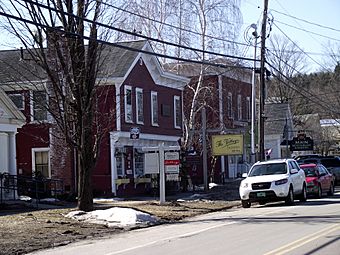Jeffersonville Historic District facts for kids
Quick facts for kids |
|
|
Jeffersonville Historic District
|
|
 |
|
| Location | Church, Main, Maple, and School Sts., Carlton Ave., VT 108, and Brewster Ave., Cambridge, Vermont |
|---|---|
| Area | 63 acres (25 ha) |
| Architectural style | Colonial Revival, Bungalow/craftsman, Greek Revival |
| NRHP reference No. | 86002929 |
| Added to NRHP | April 10, 1987 |
The Jeffersonville Historic District is a special area in Jeffersonville, Vermont. This village is the biggest part of the town of Cambridge, Vermont. It's like a time capsule, showing off many cool buildings from the 1800s and early 1900s. This district was added to the National Register of Historic Places in 1987. This means it's an important place to protect!
Contents
History of Jeffersonville
The village of Jeffersonville is located in a rich, flat area. It sits between the Lamoille River and the Brewster River. The Brewster River flows into the Lamoille River.
How the Village Started
Jeffersonville began in the early 1800s. The Brewster River was perfect for powering factories and mills. This made the village a good spot for businesses to grow.
The first person to settle here was John Brewster. He arrived in the 1780s. The village officially became a town in 1827.
Building Styles Over Time
As the village grew in the 1800s, many homes were built in the Greek Revival style. These buildings often look like ancient Greek temples.
Later, around the early 1900s, more beautiful buildings appeared. These were built in Victorian and Colonial Revival styles.
Exploring the Historic District
The Jeffersonville Historic District is shaped a bit like the letter "L". It stretches west along Church Street. It also goes north along Main Street from where they meet.
Streets and Buildings
Maple Street runs next to Main Street on the west side. School Street branches off Main Street to the east. These streets form a simple grid pattern.
Most of the 67 buildings in the district are historic. They show off many different styles popular in the 1800s and early 1900s.
Unique Structures
Only a few buildings in the district are made of brick. These include a church, a store, and some school buildings. Most buildings are one or two stories tall. Their designs are usually simple and traditional for the area.



